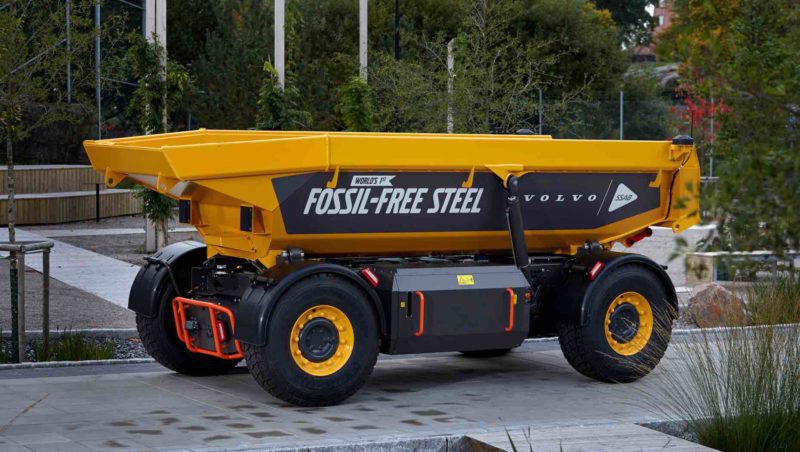Swedish automaker Volvo Group has unveiled what it says is the world’s first vehicle made from fossil-free steel, a load carrier for use in mining and quarrying that was made using steel produced through a novel process involving green hydrogen.
Volvo’s announcement this week that it has produced the world’s first vehicle made from fossil fuel-free steel is a landmark achievement, and an important step in demonstrating the value of removing fossil fuels from the production equation.
The Volvo load carrier was unveiled at a green steel event on Wednesday at its headquarters in Gothenburg, Sweden. The steel was provided by Swedish steel manufacturer SSAB, one of the largest in the world, which will also provide more fossil fuel-free steel for a series of concept vehicles and components Volvo will launch through 2022.
“This initiative with SSAB sets the benchmark for a fossil-free future,” said Martin Lundstedt, president and CEO of Volvo Group. “Just as the nations of the world come together at COP26 to address climate change, so too must organizations and industries work in collaboration to develop innovative new solutions for a greenhouse gas emission free future.
SSAB announced two months that it had manufactured the first fossil fuel-free steel via the Hybrit partnership with LKAB and Vattenfall. It was made at the world-first fossil-free steel pilot plant located in Luleå, Sweden, in late-August 2020.
Hybrit steel production replaces the traditional blast furnace process – which relies on carbon and coke to remove the oxygen from iron ore – with a direct reduction process involving green hydrogen produced from water using electricity generated by renewable energy sources. As a result, instead of carbon dioxide, water vapour is formed.
“Having the world´s first actual vehicle made using SSAB´s fossil-free steel is a true milestone. Our collaboration with Volvo Group shows that green transition is possible and brings results,” said Martin Lindqvist, the president and CEO at SSAB.
SSAB is aiming to supply the market with fossil fuel-free steel at a commercial scale by 2026 after a conversion of its Oxelösund blast furnaces into an electric arc furnace and by using Hybrit technology.
Joshua S. Hill is a Melbourne-based journalist who has been writing about climate change, clean technology, and electric vehicles for over 15 years. He has been reporting on electric vehicles and clean technologies for Renew Economy and The Driven since 2012. His preferred mode of transport is his feet.



